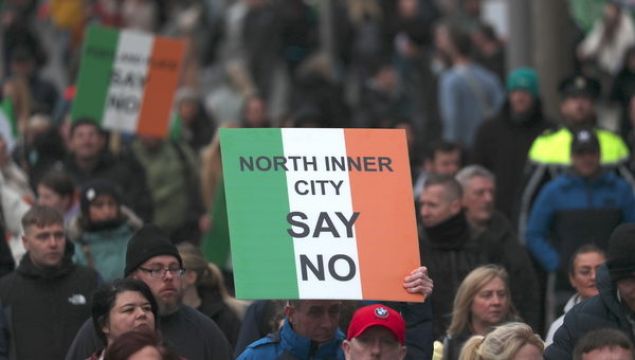Anti-refugee disinformation is targeting similar anxieties and uncertainties as anti-vaccine and anti-lockdown conspiracy theories, however, there are also key differences, according to a psychology professor.
Amid the rising number of anti-refugee demonstrations across the country, far-right groups have tried to capitalise on unrest and people's fears over the housing crisis.
This has created a "perfect storm" according to Dr Simon Dunne, assistant professor in psychology at Dublin City University (DCU).
Dr Dunne told BreakingNews.ie: "It was a very different context with Covid but some of the underlying impetus, in some ways the emotional landscape is similar.
"During the early days of Covid you had a lot of uncertainty and anxiety that was relating to the pandemic and the lack of clear guidance on what we should be doing in relation to the public health measure response.
"Similarly, there has been a lot of social upheaval resulting from the war in Ukraine and other global events recently... which has kind of shifted some of that uncertainty.
"There are a lot more refugees coming into the country compared to previous years and this is something which has happened relatively quickly and the management of housing... there's almost a similar issue in terms of the perception of how things are being managed, which creates anxiety.
"The lack of a clear plan, of strong decision-making on things... or that the decision-making is not transparent or clear, all of those things can create that uncertainty and anxiety.
"That can lead to these fringe groups taking advantage of that uncertainty and anxiety in particular areas by suggesting that there is a problem with immigration, or it's leading to certain problems... and almost creating an opportunity for a sense of belonging for people within that group where there's high anxiety, and who might have a need for certainty.
'Us vs them' mentality
"The uncertainty is different now than during the early days of Covid... it's uncertainty in relation to resources. Historically it's common to see a rise in discrimination and 'us vs them' mentality where resources become more scarce. Where there is a perception that Government is making decisions without public consultation or that they're being cagey about what they're doing.
"This is very similar to the Covid issue where there are strong alternative voices, that can galvanise people from fringe points of view with very strong perspectives, and they see others possibly from their own communities or social groups.
"There's a need for belonging in a sense of the uncertainty but also a need for strong leadership in relation to resource management and I think there are perceptions that this has not been happening... particularly in relation to housing.
"It's not a contentious thing to say that over the last number of years there has been a lot of discussion about issues relating to housing, and this is a perfect storm when adding an increasing number of refugees coming into the country into the mix.
"There are similar tactics that are used to galvanise support by individuals from these fringe groups. There are similar tactics and a lot of the time it's undercutting the value of Government, bringing in emotive cases or experiences relating to issues of security, all of those things are tactics that have been used many times before as a way of trying to galvanise support."
Conspiracy theories
He added: "What I'm saying is there is similar kind of impetus for conspiracy theories or how people are responding to conspiracy theories because the emotional landscape is quite similar, that there is uncertainty related to it.
"That's where the need for trying to control that anxiety is... where fringe groups who offer a way forward and a plan or a form of activism. That is an attempt to do something where there is a perception that the Government is not doing enough or doing a good enough job in managing things.
"The management of housing has been a huge bone of contention. There is a resentment when certain things or services are offered to individuals, that can create an 'in group' and 'out group' mentality.
"Within the context of uncertainty, there's a global economic issue that's creating anxiety amongst people. All of these factors can push people to adhere to these fringe groups to a greater extent."
A number of individuals who were involved in stoking up fear and anger over lockdown measures have reportedly shifted to anti-refugee messaging recently.
Dr Dunne said the current issues are also very different to what we experienced during lockdowns, however, the key similarity is that it is a period of uncertainty.
"It is partly a product of the time and the context, it is quite different to what we were talking about before in relation to Covid, but it is also a time of change and a period of uncertainty that most people have been grappling with. People want something that will ease that anxiety or find a way through it, and often it can be found in fringe voices who speak loudly on a particular subject and suggesting they are giving voice to certain things that are not being heard basically."
Claims that refugees were involved in an alleged sexual assault in Dublin recently prompted gardaí to take the unusual step of revealing they were looking for a white Irish male in relation to the incident.
Dr Dunne said this type of incident is common for those trying to normalise discrimination towards refugees.
"I believe in relation to the current anti-refugee issues arising, some of the discourse seems to be focusing in on particular incidents that are perceived to have happened, allegations of abuse.
"If somebody in your 'out group' commits any kind of anti-social act, even if there are many people in your in group who commit anti-social acts, people from Ireland basically, it's seen as a justification for discrimination or stigma towards people in that 'out group'.
"I think there's an element of that which the fringe voices seem to be using for individual instances, being framed in a guise of safety in some quarters at least.
"The problem with social media... TikTok, Facebook, their algorithms become an echo chamber of certain pieces of information, and false information. The talk about it can be disguised in such a way that it is not clearly hate speech, or talking about things in the sense of 'security'. It's definitely a problem, and it's a problem in how we increasingly access information in general."
Public consultation
A lack of consultation in local communities on housing has been cited as one area where Government could improve communications with people.
This was one of the findings of the STOPFARRIGHT project. The lead researcher of the project, Professor Barry Cannon of Maynooth University, recently spoke to BreakingNews.ie about this research.
Dr Dunne echoed these sentiments on the need for better public consultation.
"I think the best way to tackle that, speaking from my own psychology perspective, would be to allow people a public consultation platform where their voices and concerns can be expressed and heard in relation to the housing of refugees... and to be able to discuss or to have an open forum for expressing potential issues relating to housing.

"Having some kind of mechanism to allow for that is really important, but ultimately refugees have to be housed somewhere.... not to wade into the politics of that, but given the current stance of the Government in relation to this to allow some public forum where people from local communities are able to give voice to their concerns in relation to housing I think is really important."
In terms of trying to speak with friends or family members who believe disinformation around refugees, Dr Dunne said a non-confrontational approach is crucial.
"Dismissing people or butting heads will just make people feel more marginalised or defensive, allowing people to give voice to their concerns and to address inaccuracies if they are there I think is really important.
"If you're talking to a family member or friend who has a particular perspective it's really important to avoid emotive language in relation to what you're talking about, and allow the discussion to relate particularly to the concerns themselves, and whether they make sense or are grounded in anything at all."







